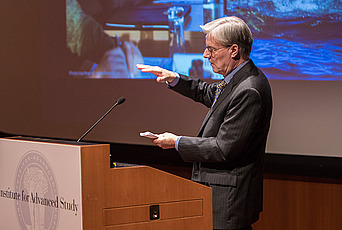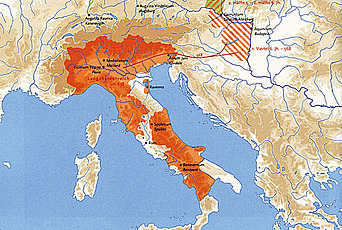History and Peacemaking

Human beings have waged war or engaged in violent conflict with each other since ancient times, an observation that prompted a Member at the Institute to suggest in the course of a casual conversation that surely it was a waste of time and resources to try to prevent or resolve armed conflicts, since there will always be others.
War, by any name,* does indeed seem to be a permanent feature of human society, as is disease for that matter. We do not consider the efforts of physicians to cure patients or the research that goes into finding cures for illnesses a waste of time, despite this. Both phenomena, armed conflict and disease, change over time as circumstances change and as human beings develop ways to prevent or cure some kinds of ills. A doctor treats a patient for that patient’s sake without necessarily having an impact on the propensity of others to fall ill. Mediators and facilitators seek to help resolve conflicts to bring an end to the suffering of those caught in their violence and destruction. Researchers in both fields hope to contribute in a broader and perhaps more fundamental way to understanding and addressing causes of these human ills and to finding new or improved remedies for them.
The vast majority of violent conflicts in the world today are intrastate, i.e., within states rather than between them. Those I have been engaged in preventing or resolving as a mediator, facilitator, or adviser to negotiators, have mostly been between a country’s government and a population group within that country seeking a cultural or political autonomous status, a special constitutional arrangement, or independence. In these kinds of conflict, history typically plays an important role. The entrenched and deeply felt “truth” of the respective perceptions of history on each side of a conflict contributes to its intractability and constitutes a serious obstacle to its resolution, in some cases literally blocking the negotiations and therefore the peace process.
The justice or injustice of past actions is felt and argued on the basis of each side’s understanding of history; parties also view their rights and make substantive claims on that basis. Even where it is not made explicit, a party’s belief in or use of a particular interpretation of history is the foundation on which it builds its claims, positions, and expectations. Mediators too often trivialize arguments put forth by negotiating parties on the basis of history, especially if the latter invoke things that took place centuries ago and use sources and accounts that may be specific to a culture and unfamiliar to the mediator or those that he/she does not consider credible. Some mediators exhibit impatience and irritation at those who dwell on the past and thereby ostensibly inhibit progress in resolving the conflict. Others focus on getting parties to come to a shared understanding of specific events in the past. And some, like myself, find themselves listening all too patiently to repeated passionate historical accounts, week after week, month after month, and, in some instances, year after year.
To be sure, if parties are able to set aside their differences with respect to their pasts, it becomes much easier to look at new ways to coexist in the future. And this is precisely the challenge we face: how can mediators work with parties to address convictions and arguments grounded in perceptions of history, knowing that these inform the parties’ aspirations and positions?
I have chosen the approach of delving deeply into history, not with the intention to establish the truth or prove respective perceptions right or wrong, but to understand how they arose and what sustained the divergent historical narratives that live on today. Many intrastate conflicts can be traced to the effects of colonialism, to the actions of political leaders in response to the newly emerging world order centered on European concepts of international law and equality of “civilized” nations, and to the transformation of empires into nation-states. To understand the significance of what happened, and to appreciate differing interpretations by conflicting parties of the legitimacy of the new states and power relations, we need to go further back in history and study the nature of the polities that existed and of the relations they maintained with one another before then.
With the help of historians, political scientists, social anthropologists, and other scholars, I am testing, among others, the following hypotheses:
- placing history and historical perceptions in the context of their historical periods rather than interpreting history retroactively from a present-day frame of reference can help undo some of the loaded modern political and legal reinterpretations of past relationships that tend to inform the perceptions of conflicting parties;
- placing the history of a people or state, or that of relations between them, in the broader context of regional, continental, or even world history can recast the discourse from a predominantly bilateral focus to a multilateral and more complex one that could challenge some of the assumptions contained in the simpler, often mutually exclusive narratives;
- recognizing and understanding the nature of the different world views that existed, and possibly still exist, which largely determined the manner in which historical events and relationships were interpreted and explained, sheds light on some of the sources of divergent interpretations;
- exposing how, by whom, and why certain historical narratives informing today’s perceptions and convictions were developed may contribute to a more realistic appreciation of the value of historical narratives.
This approach, if valid, should help in the search for ways to address the hold that absolute and exclusive views of the “truth” of particular narratives and perceptions have on parties as well as diminish the ability of some to knowingly use false or distorted representations of history for their gain. It might also create avenues for different, less absolute or exclusive and incompatible, historical perceptions to coexist.
————————––––––––––––––
Conflicting perceptions of history play a role in violent conflicts and can hold peace processes hostage anywhere in the world. Given my own experience in various parts of Asia, where such problems are very prevalent, I set out, with the help of leading scholars in the field, to find new ways of addressing this phenomenon by looking more closely at perceptions of history in that continent. The methodology, if found valid and helpful, could be applied in other parts of the world as well.
In East, Southeast, North, and Inner Asia, over the course of centuries, the existence and coexistence of seemingly incompatible interpretations of events and of relations among polities and leaders developed, rooted in distinct world views. For long periods of time, the Mongol Chinggisid conceptualization of the state and empire, of the legitimacy of rulers, and of the place of Chinggis Khan’s descendants in the world as they understood it coexisted with a Confucian world order in which all relations of the emperor, the Son of Heaven, with other leaders could only be portrayed as unequal ones between a supreme and benevolent ruler and subservient supplicants, and a Tibetan Buddhist world view in which the religious teacher was supreme and worldly leaders gained merit by protecting and supporting their teacher and showing him devotion. In Southeast Asia, Buddhist narratives of universal rulership (chakravartin)—for example, of Burmese monarchs—similarly coexisted with other seemingly contradictive Confucian narratives of subjection projected by the emperors of China.
The above admittedly simplistic characterizations are in no way intended to imply that relations were always harmonious and peaceful. War, conquest, looting, and pillaging occurred in all parts of Asia at various times in the past centuries. The different renditions of reality themselves, however, did not, for the most part, render them mutually exclusive in practice despite the political consequences they undoubtedly had.
A layer of complexity was added with the advent of self-serving European concepts of international law, including those of exclusive sovereignty and territorial ownership, the law of conquest and title, and the nation-state concept, as well as the division of the world into civilized and not-civilized nations, which pushed Asian rulers to recast their understanding and representation of their own state’s place in the world and of their relations with others in ways that would secure for them a dignified place in the emerging world order of the nineteenth and early twentieth centuries. The tensions caused by this transformation of traditional Asian state and empire formations are still felt today as arguments of history and international law—infused with nationalist rhetoric and used to justify the unwilling incorporation of peoples and territories into newly reconfigured nation-states—are still contested.
By gaining a deeper understanding of the complexities of historical relations on the Asian continent, and by testing the hypotheses mentioned above, I hope to develop an effective method that mediators can apply to overcome the recurring obstacles posed by conflicting perceptions of history in intrastate peace processes.
* The terms armed or violent conflict and war are used interchangeably in this article to denote organized use of force by two or more groups (the parties to the conflict) in the pursuit of political and sometimes economic goals.


